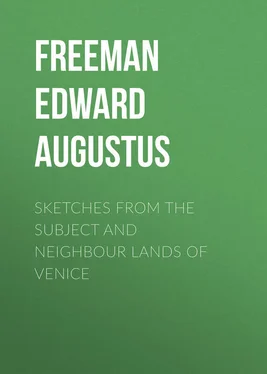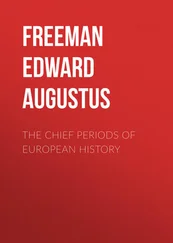Edward Freeman - Sketches from the Subject and Neighbour Lands of Venice
Здесь есть возможность читать онлайн «Edward Freeman - Sketches from the Subject and Neighbour Lands of Venice» — ознакомительный отрывок электронной книги совершенно бесплатно, а после прочтения отрывка купить полную версию. В некоторых случаях можно слушать аудио, скачать через торрент в формате fb2 и присутствует краткое содержание. Жанр: foreign_antique, foreign_prose, Путешествия и география, на английском языке. Описание произведения, (предисловие) а так же отзывы посетителей доступны на портале библиотеки ЛибКат.
- Название:Sketches from the Subject and Neighbour Lands of Venice
- Автор:
- Жанр:
- Год:неизвестен
- ISBN:нет данных
- Рейтинг книги:3 / 5. Голосов: 1
-
Избранное:Добавить в избранное
- Отзывы:
-
Ваша оценка:
- 60
- 1
- 2
- 3
- 4
- 5
Sketches from the Subject and Neighbour Lands of Venice: краткое содержание, описание и аннотация
Предлагаем к чтению аннотацию, описание, краткое содержание или предисловие (зависит от того, что написал сам автор книги «Sketches from the Subject and Neighbour Lands of Venice»). Если вы не нашли необходимую информацию о книге — напишите в комментариях, мы постараемся отыскать её.
Sketches from the Subject and Neighbour Lands of Venice — читать онлайн ознакомительный отрывок
Ниже представлен текст книги, разбитый по страницам. Система сохранения места последней прочитанной страницы, позволяет с удобством читать онлайн бесплатно книгу «Sketches from the Subject and Neighbour Lands of Venice», без необходимости каждый раз заново искать на чём Вы остановились. Поставьте закладку, и сможете в любой момент перейти на страницу, на которой закончили чтение.
Интервал:
Закладка:
But besides physical changes, changes of name, changes of inhabitants, we are perhaps yet more deeply struck with the fluctuations in the history of the cities of this region. In this matter, throughout the Venetian land, the first do indeed become last and the last first. No city in this region has kept on that enduring life through all changes which has belonged to many cities in other parts of Europe. We do not here find the Roman walls, or the walls yet earlier than Roman days, fencing in dwelling-places of man which have been continuously inhabited, which have sometimes been continuously flourishing, through all times of which history has anything to tell us. We need not take our examples from Rome or Athens or Argos or the Phœnician Gades. It is enough to look to one or two of the capitals of modern Europe. At the beginning of the fifth century, London and Paris, not yet indeed capitals of kingdoms, were already in being, and had been in being for some centuries. But far above either ranked the great city of north-eastern Italy, then one of the foremost cities of the world, the ancient colony of Aquileia, keeper of one of the great lines of approach towards Italy and Rome. No one city had then taken the name of the Venetian land; no wanderers from the mainland had as yet settled down like sea-fowl, as Cassiodorus puts it, on the islands of the lagoons. By the end of the fifth century both London and Paris had passed from Roman rule to the rule of Teutonic conquerors. London, we may conceive, was still inhabited; at all events its walls stood ready to receive a fresh colony before long. Paris had received one of those momentary lifts of which she went through several before her final exaltation; the city which had been favoured by Roman Julian was favoured also by Frankish Chlodwig. But Aquileia had felt the full fury of invaders who came, not to occupy or to settle, but simply to destroy. As a city, as a bulwark of Italy, she had passed away for ever. But out of her fall several cities had, in the course of that century, risen to increased greatness, and the greatest of all had come into being. The city was born which, simply as a city, as a city bearing rule over distant lands, must rank as the one historic peer of Rome. Not yet Queen of the Hadriatic, not yet the chosen sanctuary of Saint Mark, not yet enthroned on her own Rialto, the settlement which was to grow into Venice had already made its small beginnings.
But the fall of Aquileia, the rise of Venice, are only the greatest examples of a general law. A nearer neighbour of Aquileia at once profited by her overthrow; Grado, on her own coast, almost at her own gates, sprang up as her rival; but the greatness of Grado has passed away only less thoroughly than the greatness of Aquileia. So the Venetian Forum Julii gave way to its more modern neighbour Udine. It lost the name which it had given to the land around it. Its shortened form Friuli lived on as one of the names of the surrounding district, but Forum Julii itself was forgotten under the vaguer description of Cividale . Gorizia has been for ages the head of a principality; in later times it has been the head of an ecclesiastical province. But Gorizia is absolutely unknown till the beginning of the eleventh century, and it does not seem even to have supplanted any earlier city. It is thus a marked peculiarity of this district that the chief towns, with Venice itself at their head, have not lived on continuously as chief towns from Roman or earlier times. West of Venice the rule does not apply. Padua and Verona are old enough for the warmest lover of antiquity, and Vicenza, going back at least to the second century B.C., must be allowed to be of a respectable age.
That the chief cities of a district should date from early mediæval, and not from Roman times, is a feature which at once suggests analogies with our own island. Both in Venetia and in Britain we are struck with the prevalence of places which arose after the fall of the elder Roman power, in opposition to most parts of Italy and Gaul, where nearly every town can trace back to Roman days or earlier. But the likeness cannot be carried out in detail. In the district which we have just marked out it is absolutely the greatest cities – one of them so great as to be put out of all comparison with the others – which are of this comparatively recent date. In England, though the great mass of the local centres are places of English foundation and bearing English names, yet the greatest and most historic cities still carry the marks of Roman origin about them. Some Roman cities in Britain passed utterly away; others lived on, or soon came to life again, in the forms of York, London, and Winchester. But in Venetia it is the cities which answer to York and London which have lost their greatness, though they have not utterly passed away. This last fact is one of the characteristics of the district; the fallen cities have simply fallen from their greatness; they have not ceased to be dwelling-places of man. Aquileia and Forum Julii have ceased for ages to be what Aquileia and Forum Julii once were, but they have not become as Silchester, or even as Salona. Of the position of all these places there is no manner of doubt. They are there to speak for themselves; even Julium Carnacum, whose site has had to be looked for, still abides, though those who have reached it describe it as a small village. Aquileia under its old name, Forum Julii under its new name, are still inhabited, they still hold the rank of towns; but while they still abide, the rule that the first should become last and the last first is carried out among them. As ancient Aquileia was far greater than ancient Forum Julii, so modern Aquileia, though it keeps its name, is now far less than modern Cividale, from which the name of Forum Julii has passed away.
Читать дальшеИнтервал:
Закладка:
Похожие книги на «Sketches from the Subject and Neighbour Lands of Venice»
Представляем Вашему вниманию похожие книги на «Sketches from the Subject and Neighbour Lands of Venice» списком для выбора. Мы отобрали схожую по названию и смыслу литературу в надежде предоставить читателям больше вариантов отыскать новые, интересные, ещё непрочитанные произведения.
Обсуждение, отзывы о книге «Sketches from the Subject and Neighbour Lands of Venice» и просто собственные мнения читателей. Оставьте ваши комментарии, напишите, что Вы думаете о произведении, его смысле или главных героях. Укажите что конкретно понравилось, а что нет, и почему Вы так считаете.












